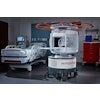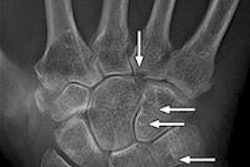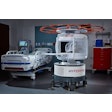Dear MRI Insider,
Although the routine clinical use of 7-tesla MRI may be several years away, researchers at Vanderbilt University have begun testing implants and other devices to determine whether patients with them can be scanned safely with ultrahigh-field magnets.
This issue of the Insider offers a look at how tests were conducted on 28 objects, including aneurysm clips, a hemostatic clip, vascular and orthopedic implants -- and even a bullet. Find out which ones posed a threat to patient safety at 7-tesla MRI in our Insider Exclusive, available to you before our other AuntMinnie.com members.
In other news, the average age of the installed base of MRI scanners in the U.S. grew from 8.7 years in 2010 to 11.4 years in 2013, meaning that many scanners could be due for a replacement. The market research report by IMV Medical Information Division found that the last spike of new MRI installations took place from 2002 to 2004, and the market appears ready to replace older units and also take advantage of wider bore sizes and higher magnet field strengths.
A study from Korea found that breast MRI computer-aided detection (CAD) software still misses some breast cancers, despite its ability to improve detection. Researchers from Kangbuk Samsung Hospital discovered that histopathology factors such as tumor type, invasiveness, and low nuclear grade were associated with the cancer detection performance of breast MRI CAD in the group of more than 300 breast cancer patients.
Speaking of CAD, an algorithm that makes use of anatomic data from MRI scans can help radiologists differentiate between benign and malignant brain tumors on FDG-PET images. Japanese researchers used an internally developed algorithm that classifies tumors via image texture features on FDG-PET. The result was 100% sensitivity and 80% specificity in the 24-patient study.
In cardiology news, certain MRI findings can independently predict future cardiovascular events in patients with coronary artery disease or those who recently had a heart attack, according to a Dutch study. The key is choosing the correct variable. In a meta-analysis of 56 previous studies, the researchers found that some cardiac MRI features are predictive for some types of patients, while there aren't enough data to support the prognostic power of other results.
In addition, whole-body diffusion-weighted MRI (DWI-MRI) can help assess treatment response in patients with myeloma and potentially reduce the number of painful bone marrow biopsies they need to undergo. A U.K. study found that DWI-MRI showed the spread of myeloma throughout the bone marrow better than conventional tests.
Stay in touch with the MRI Digital Community on a daily basis to view the latest news and novel research from around the world.
Disclosure notice: AuntMinnie.com is a subsidiary of IMV Ltd.




















